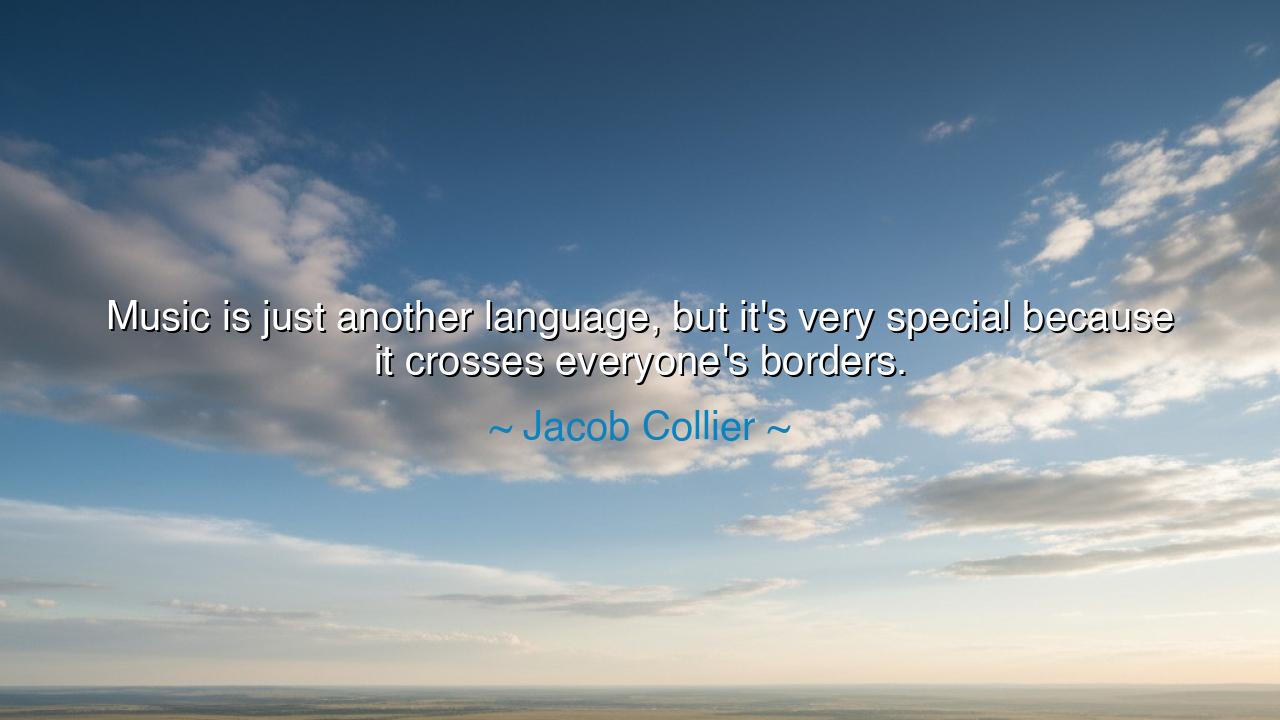
Music is just another language, but it's very special because it
Music is just another language, but it's very special because it crosses everyone's borders.






Hear now the words of the young sage and master of harmony, Jacob Collier, who declared: “Music is just another language, but it’s very special because it crosses everyone’s borders.” These words strike not only the ear, but the soul, for they reveal the secret of melody and rhythm—that it is more than sound, more than entertainment, more than art. It is a language, ancient and primal, one that speaks not to the mind alone, but to the very marrow of the spirit. Unlike tongues divided by region and tribe, music has no boundary it cannot cross, no wall it cannot climb, no heart it cannot touch.
Consider the power of this truth: nations may quarrel, kings may raise armies, and men may argue endlessly over words, but a song can still bring tears to the eyes of both friend and foe. For in the mystery of harmony, there is no foreigner, no stranger—only a shared humanity. Where speech may falter and translation may stumble, music becomes the interpreter of the heart. Thus it is that Collier speaks with wisdom, naming it a language yet beyond languages, a bridge over rivers that divide.
History itself testifies to this. Recall the story of the Christmas Truce in the year 1914, when World War I raged across the fields of Europe. On Christmas Eve, German soldiers began to sing Silent Night in their tongue, and soon the voices of British soldiers joined in, each in their own language, yet bound together by melody. For a brief moment, the guns were silent, and men who had been enemies stepped into the no-man’s-land to share bread, laughter, and even gifts. It was not speeches nor treaties that brought this peace, but music, the one language that could cross the borders of hatred and remind men of their shared soul.
Indeed, music has always carried this divine quality. The drumbeats of Africa, the chants of monks in stone cathedrals, the flutes of Asia, the guitars of Spain—all are different voices, yet when they are heard, they awaken the same flame in the human heart. This is why Collier calls it “very special”—because while other languages divide by region and history, music unites by spirit and by truth. It does not ask where you were born, or what creed you follow, or what tongue you speak. It simply says: Here is beauty. Do you feel it too?
The lesson, then, is not only about music, but about life itself. If music can cross borders, so too can love, kindness, and compassion. Just as a melody ignores the lines drawn on maps, so too can our actions defy the divisions of race, nation, and creed. To walk in harmony with others is to live musically—to let your life be a song that speaks across boundaries.
Therefore, let each of us take this wisdom into practice. Do not keep your music—whether literal or symbolic—locked away. Share it. Sing your truth, play your part, and listen to the melodies of others. Learn not only to express, but to hear, for in the listening lies the bridge to another soul. Use the power of music to soften anger, to comfort the weary, to unite the divided. For every time you do, you prove that borders are but illusions, and the human heart knows a deeper truth.
So let the teaching of Collier endure: music is indeed a language, but it is the most wondrous of all, for it does not separate—it unites. Walk, then, as musicians of life. Let your words, your deeds, and your spirit be like a song that can be heard by all, whether near or far. For in the end, we are not many tribes divided by tongues—we are one humanity, whose truest voice is the song that rises from the soul.






AAdministratorAdministrator
Welcome, honored guests. Please leave a comment, we will respond soon